This Christmas, All I Want Is a Ceasefire
Until that happens, we can lean into the true meaning of Christmas by advocating for victims of war in Gaza and the West Bank.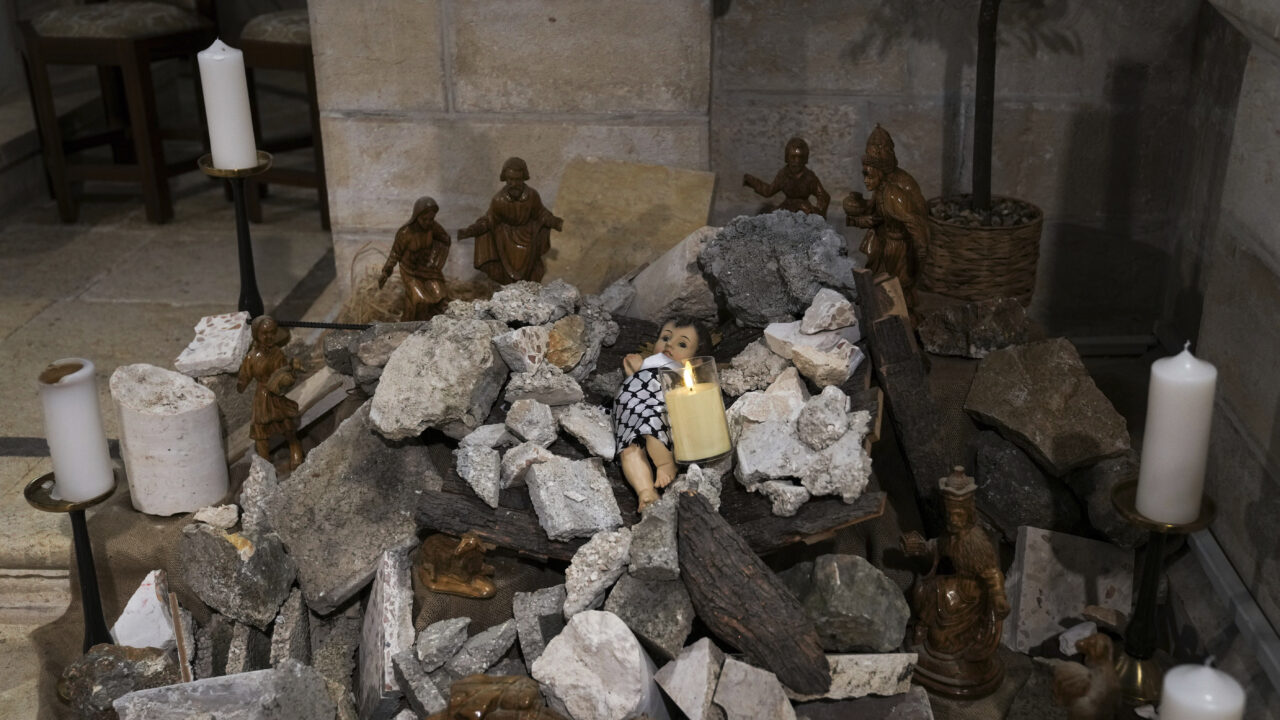 An installation of a scene of the Nativity of Christ with a figure symbolizing baby Jesus lying amid the rubble, in reference to Gaza, inside the Evangelical Lutheran Church in the West Bank town of Bethlehem, Sunday, Dec. 10, 2023. Christmas celebrations in Bethlehem have been put on hold due to the ongoing war. (AP Photo/Mahmoud Illean)
An installation of a scene of the Nativity of Christ with a figure symbolizing baby Jesus lying amid the rubble, in reference to Gaza, inside the Evangelical Lutheran Church in the West Bank town of Bethlehem, Sunday, Dec. 10, 2023. Christmas celebrations in Bethlehem have been put on hold due to the ongoing war. (AP Photo/Mahmoud Illean)
Christmas has been canceled in the Holy Land. Decorations that have hung for years in Bethlehem have been taken down, parades will not take place, and streets typically overflowing with tourists are empty. Thus, the cultural and religious holiday that commemorates the birth of Jesus Christ will be celebrated by billions across the globe but not in the place where Jesus—and Christianity—were born.
The Patriarchs and Heads of the Churches in Jerusalem, an interdenominational group of church leaders in the Holy Land, made the announcement on Nov. 10. While the season is normally marked with delight, “These are not normal times,” they wrote. “Since the start of the war, there has been an atmosphere of sadness and pain. Thousands of innocent civilians, including women and children, have died or suffered serious injuries. Many more grieve over the loss of their homes, their loved ones, or the uncertain fate of those dear to them. Throughout the region, even more have lost their work and are suffering from serious economic challenges. Yet despite our repeated calls for a humanitarian ceasefire and a de-escalation of violence, the war continues.”
Outgoing mayor Hanna Hanania told the Catholic News Agency, “Bethlehem, as any other Palestinian city, is mourning and sad… We cannot celebrate while we are in this situation.”
So, on Christmas Eve, at the Catholic church in Los Angeles where I worship, red poinsettias and pine trees with lights will line the altar. Children will reenact the feast of the Nativity. Some will wear angels’ wings and others will carry shepherds’ staffs. The next morning, they’ll wake up to numerous presents hidden under the tree and even more from Santa. All this while the streets surrounding the Church of the Nativity—the actual birthplace of Jesus in Bethlehem in the occupied West Bank of Palestine—will be dark. Mass will be simple. Those who have money for extra will give it to others who have lost their homes and livelihoods.
This paradox feels unbearable. It reminds me of Zaina Arafat’s essay “Witnessing Gaza Through Instagram,” in which she writes, “‘Everything normal right now is obscene,’ I heard Israeli journalist Amira Hass say early on in the war, and it’s true. Even sitting down to articulate this moment feels obscene.”
“Bethlehem, as any other Palestinian city, is mourning and sad… We cannot celebrate while we are in this situation.”
And yet, the decision to nix festivities in the Holy Land is not surprising given the last few months, which leading genocide and Holocaust experts describe as “an unfolding genocide.” About 1.8 million people in Gaza, or nearly 80% of the population have been displaced. As of Nov. 17, more than 25,000 bombs—the equivalent of two nuclear bombs—had been dropped on Gaza by Israeli forces with unwavering support by the United States government. More than 20,000 Palestinians have been killed, including more than 8,000 children, and dehydration and starvation are on the rise given there’s “no water, no food, no electricity, no internet, nothing,” per journalist Muhammad Smiry, who is from and continues to report from Gaza. These numbers far surpass the impact of the 1948 war that established the state of Israel, which was a welcome relief for Jews in the wake of the Holocaust but is referred to in Arabic as the “Nakba,” or “catastrophe,” because it resulted in the permanent displacement of half of the Palestinian population.
There has also been recent trouble in the West Bank. As of Dec. 3, more than 1,200 Palestinians have been displaced amid settler violence, 3,270 have been injured, and more than 200 murdered by Israeli forces.
Ibrahim Dabbour, the Jordan Council of Church Leaders general secretary and a Greek Orthodox priest, suggests that refraining from typical holiday celebrations offers an opportunity for unity. “Many Muslims do not know the history of Christianity, thinking we are a people of the West,” he said. “But we are the sons of St. Peter, here for 2,000 years. We want to show society that we are one people.”
So where does all this leave those of us in the diaspora who celebrate Christmas whether culturally or religiously?
I believe we have three options.
We could celebrate as we normally do, pretending nothing is wrong. The U.S. is set up so that those of us who live here don’t have to notice the oppression that is happening as a result of our government and tax dollars. This choice keeps us in denial and maintains the status quo.
We could cancel Christmas altogether. However, this is unlikely to have the necessary ripple effect for positive change that we need right now.
Or, we could heed the call of the leadership in the Holy Land who have asked people to stand in solidarity with the afflicted, lean into the true meaning of Christmas, and advocate for and give generously to the victims. This option of turning away from the mindless consumption that has co-opted the holiday and instead turning towards kindness and charity has the most potential for building new imaginaries and achieving a permanent ceasefire. And, it answers the recent requests from Palestinians in Gaza and the U.S. to not stop talking about Palestine.
Carrying this out will require recognizing our own significance—that every little effort counts even when it doesn’t feel like it. It will also require remembering that no matter how much we’ve been trained to function as individuals, we are connected to other human beings and that’s a good thing. And, it will require uniting with others, from the Muslim grassroots movement MPower Change to Jewish Voice for Peace, there are millions of people across the globe who are taking a stand and proclaiming, “Not in our name!” Stopping the most powerful militaries in the world will require creativity, connection, and collaboration like we’ve never before seen.
Stand in Solidarity
Standing with the afflicted requires bearing witness to what they are going through. “To bear witness is to record what is rendered “unspeakable,” according to Palestinian scholar Loubna Qutami. “It means understanding that violence and power work as deeply on the mind and soul as they do on the body and land. To shield the mind and soul, to protect it from that violence, requires a militant and tenacious dedication to affirming truth. Bearing witness means we open our eyes despite the pain it causes.” This is not easy.
“Bearing witness means we open our eyes despite the pain it causes.”
One challenge is finding the truth, because the media is extremely biased. For example, Emmy-nominated journalist Ahmed points out, “The Israelis released are described as ‘hostages’ whereas Palestinians are ‘prisoners,’ and Israeli children held by Hamas for weeks are described as ‘children,’ but Palestinian children held by Israel for decades are described as ‘minors’ or ‘18 and younger.’” These distortions are confusing and impact public opinion.
So, we must seek out information and educate ourselves. Follow these 16 journalists who report from the ground and share their stories. The Israeli human rights organization B’Tselem offers storytelling through video, photos, and the interactive experience “Conquer and Divide.” Learn why more than three-quarters of Israelis believe Israeli Prime Minister Benjamin Netanyahu should resign. And, while it’s crucial to stop anti-Jewish oppression, find out how the term “antisemitism” is being weaponized to chill free speech and squash the anti-war movement.
This teach-in on the architecture of Palestine explains the recent history through the built environment. This one features nine renowned feminist scholars on ending colonialism and war. Verso and Haymarket are offering free ebooks on Palestine.
Per Qutami, these four elements are key to bearing witness: recording, remembering, surviving, and resistance. How might we find ways—both big and small—to augment Christmas traditions to incorporate these?
How about sending Christmas cards that call for a ceasefire or decorating your tree with a “Free Palestine” theme? Check out Etsy and Redbubble for cards, stickers, and ornaments, or consider making your own. This holiday gifting guide from Jewish Voice for Peace offers 20 gifts that support justice for Palestinians. And for those who have loved ones who are bookworms, choose something from Lit Hub’s 40 Books to Understand Palestine. Avoid these brands when possible.
With the kids in your life, there are many options. Decorate cookies with a Palestinian flag or watermelons (a symbol of Palestinian resistance). Read and color the Palestinian Feminist Collective’s children’s workbook “Handala’s Return.” Watch the award-winning short animation film I Am from Palestine. Wrap them up a children’s book like Sitti’s Secrets or P is for Palestine.
Lean Into the True Meaning of Christmas
The Christian leadership of the Holy Land encouraged the faithful to “focus more on the spiritual meaning of Christmas in their pastoral activities and liturgical celebrations during this period, with all the focus directed at holding in our thoughts our [siblings] affected by this war and its consequences, and with fervent prayers for a just and lasting peace for our beloved Holy Land.”
The Feast of the Nativity is a story about the birth of a child who is a gift to the universe. It’s about a family thriving despite displacement and persecution. It’s about love.
When President Biden asked Congress for $105 billion to send more weapons to Israel and Ukraine, I vowed that together we must find at least 105 billion ways to end militarism and war.
Black Friday and the consumerism imposed on the holiday came way later from an economic system that prioritizes profits over people. It’s a good time to turn away from the pressure to buy to make time for learning and reflection.
For those who pray, contemplate Jesus’ legacy. He was a humble king and service-oriented leader who ministered to the persecuted and asked his followers to do the same. Indeed, in spite of our own painful past of conquest and genocide, Christians have a long history of following in Jesus’ footsteps and standing up for justice.
Pope Francis, the head of the Catholic Church, has called for a permanent ceasefire on numerous occasions and recently stated, “The Palestinian people, the people of Israel, have the right to peace.” He launched a nine-day novena, which the faithful are invited to pray for peace in the Holy Land.
Integrate resistance into your prayer life, such as praying the Holy Land rosary and listening to the music of the YMCA Jerusalem Youth Chorus. Change the lyrics of your favorite Christmas carols to call for peace and justice as the Ramallah Friends School Choir did with the “Little Drummer Boy.” Host a prayer-in as part of Gather for Gaza, and consider passing a donation basket to make it a fundraiser.
Advocate and Act
The Palestinian Feminist Collective put together the toolkit “All Out for Palestine,” which is full of ideas for action, such as contacting your representatives, marching in the streets, and taking part in the boycott, divestment, and sanctions (BDS) movement to pressure Israel to comply with international law.
There are various organizations on the ground getting food and resources to families in the region. These are a few: UNRWA USA National Committee, Palestine Children’s Relief Fund, and Defense for Children International Palestine. I plan to forgo several gift exchanges this year in order to have more funds to give to Palestinian families in need.
When President Biden asked Congress for $105 billion to send more weapons to Israel and Ukraine, I vowed that together we must find at least 105 billion ways to end militarism and war. This Christmas is a good time to keep trying.
Your support matters…Independent journalism is under threat and overshadowed by heavily funded mainstream media.
You can help level the playing field. Become a member.
Your tax-deductible contribution keeps us digging beneath the headlines to give you thought-provoking, investigative reporting and analysis that unearths what's really happening- without compromise.
Give today to support our courageous, independent journalists.
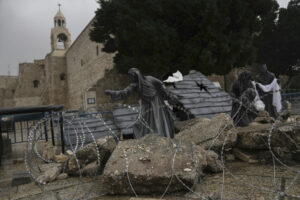
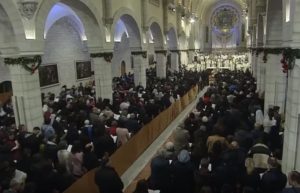
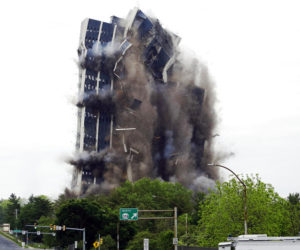
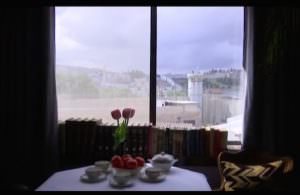
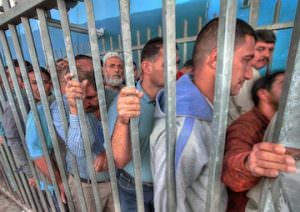
You need to be a supporter to comment.
There are currently no responses to this article.
Be the first to respond.